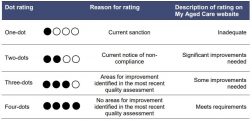A national study led by Advance Care Planning Australia has revealed 30% of the plans – which are a legal document outlining a person’s preferences and instructions for their future health care – completed for Australians living in residential care had been filled in by someone else – usually a family member – on behalf of a person deemed to be non-competent.
Worryingly, 68% of those documents included instructions for withholding life-sustaining treatment such as tube feeding or intravenous antibiotics.
This is a serious issue because it means residents could be left at risk of not receiving medical treatment that they would have wanted – or being given treatment that they would have preferred.

If an ACD is found by a facility to be invalid after the person is no longer able to make decisions for themselves, it could also cause confusion and stress for family members, aged care staff and doctors.
ACDs are a valuable tool to make sure your wishes are respected – but they are only legal when they are completed and signed by a person with decision-making capacity.
If you are concerned your family member may not have a valid ACD, you can find more information about advance care planning on our agedcare101 website here.
You can also contact Advance Care Planning Australia on their National Advisory Service (1300 208 582), 9am – 5pm (AEST) Monday to Friday.






